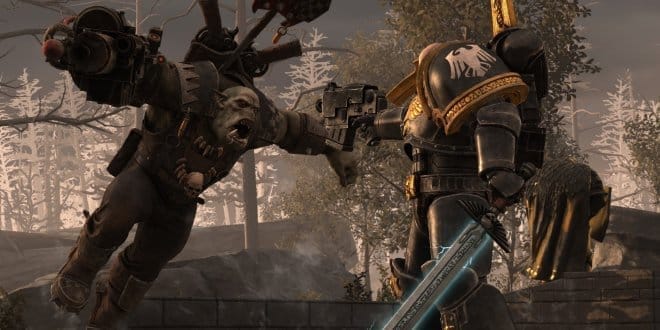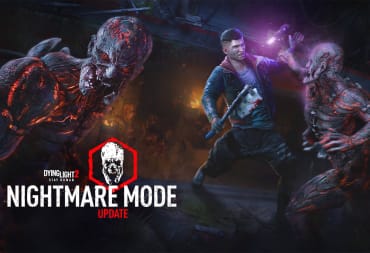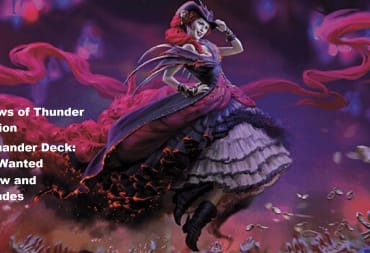Warhammer 40K: Regicide, released by Hammerfall Publishing, is a gloriously violent and refreshing reimagining of Chess, the tried and true classic board game. Sharing its name with a fictional game from 40K cannon, it offers new tactical options that radically change the original strategies of the traditional game. Set in the Warhammer 40K universe, notorious for its “grimdark” depiction of a future of perpetual war, Regicide offers plenty of organ-splattering explosions and cringe-inducing chainsword swipes to satisfy even the most bloodthirsty diehards.
Reimagining chess within different brands and with colorful combat animations is nothing new. If you are wizened enough to remember running games as executables via DOS, then gems like the 1993 title Star Wars Chess might quickly come to mind (and yes, I know Battle Chess came first). However, the core rules of these games rarely deviated from those of traditional chess. If this is what you are looking for, then Warhammer 40K: Regicide offers a “Classic” mode, complete with that infuriating En Passant.
The other mode is “Regicide”, and it marks a strong deviation from its predecessors. This mode has the movement, piece types, and capturing rules of classic chess at its core, but adds to that with the inclusion of skills and combat capabilities for individual pieces. The addition of the “initiative phase”, wherein players can spend points and have their pieces attack their opponents at a distance, is what turns Regicide into a fundamentally different game.
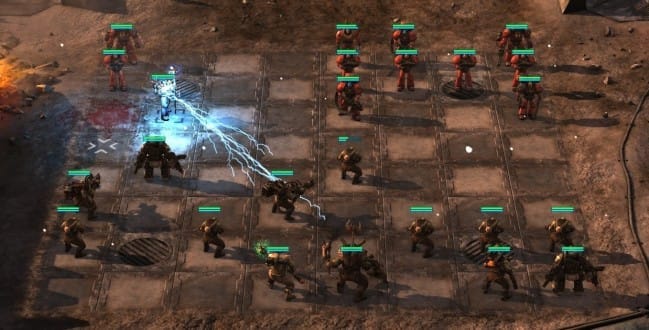
Currently there are only two factions available for play (Space Marines and Orks) in Warhammer 40K: Regicide's roster. Mitigating this somewhat is that the two armies possess different strengths and therefore different tactical options. For instance, Space Marines have higher accuracy than Orks. In a skirmish with the AI the difference in snapshot accuracy between pawns ranged attacks were 64% and 52% for respectively. This advantage is counteracted by Orcs ability to deliver more damage, especially in close quarters.
These differences, in addition to some limited skill customization options, means that players often need to take different approaches depending on whom their opponent is. A Space Marines player can gain an advantage by playing more defensively, tightly knit, and keeping their opponent at a distance while Orks will naturally do better if they can close the gap. Any of these advantages can be overcome using traditional chess capture techniques. An opening can be exploited by an observant player and lead to rapid turnovers that will put his more careless opponent on guard. Of course, solely relying on your seventh grade chess club experience or your repertoire of obscure championship gambits will quickly lead to disaster. It doesn’t take long to realize that an expert strategy you set up can disintegrate as quickly as your bishop does under withering boltgun fire.
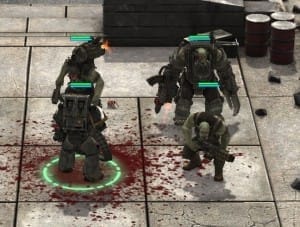
One important caveat that bears mentioning is that, while this new “initiative round” may increase options and depth of gameplay, it is heavily based on the element of chance. Almost every ability or attack is up to the whim of that greatest force in the Warhammer universe; rolls of the dice. This clashes with one of the most defining features of chess, that being the absolute certainty of each move. For many ardent chess fans, there is great value attached to the fact that raw chance is eliminated and each move has an immediate and unalterable consequence (once you take your finger off the piece that is). The appeal is that ultimately the results of any game represents an accurate depiction of each player’s skill.
In Warhammer 40K: Regicide, one could play more skillfully and strategically than his opponent plays and yet lose because of missed shots or poor luck. This can become incredibly infuriating when you somehow miss three assaults in a row (at a 90% hit chance each) and needs to be taken in stride. It is important for potential buyers eager for authenticity in any chess experience to keep this in mind as it may act as a potential deal breaker.
The game has a campaign mode that offers fifty levels that progressively ramp up in difficulty. Going beyond a simple “purge the alien” motif of eliminating all enemy units each level has its own unique objective. This, combined with variation in unit placements, makes campaign levels feel more like puzzles than slug-fests and you'll quickly find yourself planning five or six moves in advance of your turn. There was a refreshing level of variety in mission objectives and I often found myself replaying the same one repeatedly in order to achieve the nearly impossible secondary objectives. Doing so actually led to a feeling of accomplishment, and I argue that it is well worth the time to attempt them.
If you are looking for a deep, dramatic, riveting story of sacrifice and survival then you are in the wrong end of the galaxy. The campaign's overarching plot is shallow and predictable. The dialogue, of which you receive a few lines of at the beginning of each mission, remains stereotypically grimdark and deviates little from the standard fare seen in other Warhammer 40K titles. *Entirely unnecessary potential spoiler alert* I am going to go out on an incredibly short branch and argue that the Orks are probably being manipulated by a hidden enemy for some greater nefarious purpose; details most likely announced in the first DLC pack.
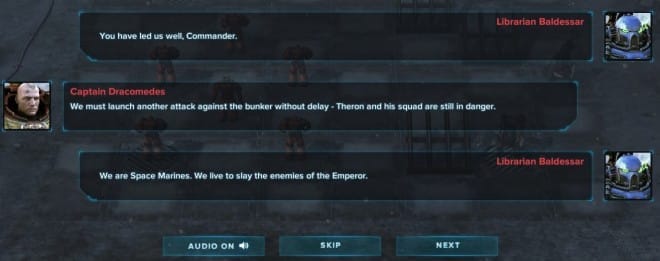
Beyond the campaign, Warhammer 40K: Regicide offers online and skirmish with AI gameplay allowing for substantial replayability. Carving up (and being carved by) faceless opponents remains enjoyable even after several days. There has been relatively little in the way of server difficulties, but since launch the online community has seen some shrinkage. That being said, the players who have remained have developed into a dedicated community, and seem much more willing to play matches to their completion than the frustrated rage-quitters of the past.
Some flaws do exist in the multiplayer experience. As it stands, there is not much in the way of variety regarding game boards or optional settings beyond the classic chess default. In addition, the lack of even a simple chat box during matches means communicating with your opponent is pretty much out of the question and there are no official plans for this to be changed in the near future. The best bet is to simply play with Steam friends and utilize Steam chat for communication.
Where Warhammer 40K: Regicide really shines is in its gritty, sanguineous and outlandish visuals. When capturing a piece you can expect a close up killcam sequence of what inevitably becomes a veritable meat grinder. In addition, the game makes use of a detached free-floating camera, allowing you to view the action from any angle you choose. Each unit has a variety of smoothly delivered violent animations, guaranteed to impress (and some to make you squirm). Even seemingly minor details adds to the games gruesome charm. For example, persistent blood stains from the more spectacularly gruesome deaths means that your board will quickly look like the floor of a slaughterhouse.
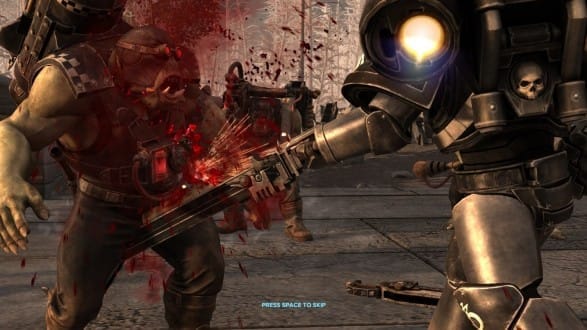
Audio quality is also superb. Sounds, whether it be the grinding buzz of a chainsword or the stomps of terminator armor, are clean and well synced with the animation. Voice over work is faithful to previous games, and the guttural cockney accent of Orks yelling “dakka dakka dakka” is satisfying as ever. The soundtrack is your standard Warhammer 40K fare. The religious-like choral vocals, long-winded horns, overwhelming arrangements of drums and strings, and samples of mechanical sounds like hammers on anvils, invokes images of ancient armies marching across great distances. While it does not stand out in any special way, it nonetheless performs well in establishing the techno-barbarism of Warhammer 40K's war torn distant future.
At one point in Early Access for Warhammer 40K: Regicide, there were some concerns regarding performance issues and poor frame rates, but these seem to have been solved as of the final release. The graphics look good, and this reviewer never suffered from the game crashing or any other significant glitches after several days of play. Most of the persistent bugs have been eliminated from the game's initial launch and there have been multiple "rebalances" of unit stats to address concerns of fairness. The fact that the development team seems eager to communicate with players on Steam forums, as well as developing multiple patches quickly, is a good indication that any flaws may be short-lived (an AI patch titled “Hotfix 2.0.1” was released within a week of release in response to player commentary and now currently sits at version 2.4.1). Finally, the game's moderate system requirements means there nothing to stop you from enjoying your front row seat of the WAAAGH!
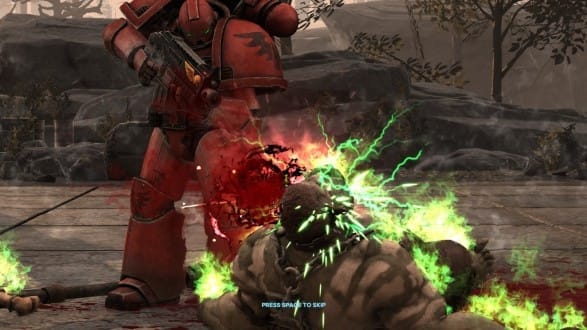
Right now, Warhammer 40K: Regicide sits at fifteen dollars on Steam. For anyone who has followed how price schemes usually work with Game Workshop's titles, fifteen dollars is an incredibly low price for anything featuring a set of over-sized pauldrons. A sour taste still sits in the mouth from the expensive release of the very dated looking Armageddon in 2014. Of course, this lower price tag may be simply part of a larger DLC strategy, as it states in the army lists that you will be able to buy new chapters and clans instead of grinding away collecting points. There has yet to be confirmation about any addition of new races (Necrons please), though forum posts by developers seem to hint that it is an area where future expansion (and future revenue) may occur.
Is it worth paying the full asking price in its current state? In my opinion, most certainly yes. Warhammer 40K: Regicide is a solid title that delivers hours of enjoyable and challenging gameplay that will satisfy chess and strategy enthusiasts alike. The low-learning curve, chances for easy upsets, and rapid pace of game play also opens the door for a wider audience. The games visual appeal may not be for everyone, but if your inner Warboss secretly enjoys watching armored behemoths tear each other apart, then it would be hard to find better at the price.
Warhammer 40K: Regicide was reviewed on PC using a copy purchased by the reviewer.
Review Summary
Re-imagined chess with solid mechanics and an overdose of guns, guts, and grimdark. Enjoys high levels of replayability, just don’t expect much in depth in story or content.
(Review Policy)Have a tip, or want to point out something we missed? Leave a Comment or e-mail us at tips@techraptor.net
